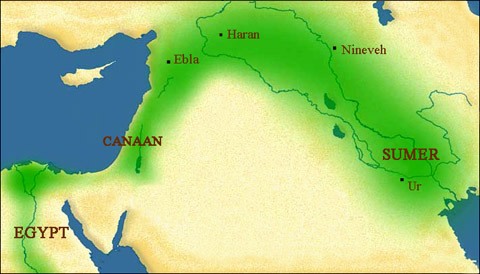1. The true meaning of Dingir for Sumerians - could they envision "God"?
 is the sign called Dingir, meaning God in Sumerian. And it also is the symbol for the sky/heavens' god An, their supreme deity. A connection to the god of the ancient Turkic peoples, Tengri, their supreme god, has been suggested by scholars. Polat Kaya a Turkish scholar says its the Turkish TENRI and connects it to the Egyptian word for God NTR and to the Indo-European word Deus (God).
is the sign called Dingir, meaning God in Sumerian. And it also is the symbol for the sky/heavens' god An, their supreme deity. A connection to the god of the ancient Turkic peoples, Tengri, their supreme god, has been suggested by scholars. Polat Kaya a Turkish scholar says its the Turkish TENRI and connects it to the Egyptian word for God NTR and to the Indo-European word Deus (God).
Dingir is different from the main paternal creating god of Sumerians, An. In fact, there is no specific god named "Dingir". Does that mean that the concept of God was distinct from the "gods" of Sumer, and as a result, the Sumerians could envision God as one absolute, true being separate from the belief in many "gods"?
2. Does the observation of multiplying gods show that originally there was belief in just one God?
The Anthropologist Custance notes:
The website Earth History notes:
If this is correct, it suggests that the Israelite Yah is the Akkadian / West Semitic Aya and the Sumerian/East Semitic Ea or Enki. And it also suggests that "El", another god for Semites, is another name for this same "Yah".
Another thing I am not sure of is whether originally for Sumerians An, the main sky god, was self-conceived or uncreated, or if he came from another god, Nammu. For example, one writing says:
3. Do similar descriptions of God across ancient civilizations mean that the one true God, and thus monotheism, is inscribed in peoples' souls, so that it's inherent to them and some of them would think of the one true God, even if a missionary or their parents didn't tell them about Him?
Bishop Alexander Mileant wrote:

Dingir is different from the main paternal creating god of Sumerians, An. In fact, there is no specific god named "Dingir". Does that mean that the concept of God was distinct from the "gods" of Sumer, and as a result, the Sumerians could envision God as one absolute, true being separate from the belief in many "gods"?
2. Does the observation of multiplying gods show that originally there was belief in just one God?
The Anthropologist Custance notes:
The Sumerian religion in its latest development before the people disappeared as an entity swallowed up by the later Babylonians, seemed to have involved about 5000 gods. The inscriptions of circa 3000 B.C. or perhaps a millennium earlier show only 750. The 300 tablets or so known from Jamdet Nasr in 1928 when Langdon published these texts, contained only. three gods; the sky god Enlil, the earth god Enki, and the sun god Babbar. The 575 tablets from Uruk translated in 1936, which Langdon dated about 4000 B.C. but are now believed to be more accurately dated 3500 B.C., contain the names of only two deities: the sky god An and the mother goddess Innina. Meek's criticism of Langdon's essay was that the number of gods he mentions for the earlier tablets is in error. In the Jamdet Nasr text there may have been as many as six, not three.
Henry Frankfort wrote in his official report:
- ...we discover that the representations on cylinder seals, which are usually connected with various gods, can all be fitted into a consistent picture in which a single god worshiped in this temple forms the central figure. It seems, therefore, that at this early period his various aspects were not considered separate deities in the Sumero-Accadian pantheon.
This raises an important point; namely, the possibility that polytheism never did arise by the evolution of polydemonism, but because the attributes of a single God were differently emphasized by different people until those people in later years came to forget that they were speaking of the same Person.
http://custance.org/Library/Volume4/Part_II/chapter1.html
The website Earth History notes:
http://www.earthhistory.org.uk/genesis-6-11-and-other-texts/the-tradition-in-sumerIn the hill-country of Canaan, on the outskirts of Sumerian civilisation, ... Abraham is greeted by Melchizedek, king of Jerusalem (Gen 14:18ff). Melchizedek means ‘The righteous one [is] king’, referring to the deity served by this priest-king, and he blesses Abraham in the name of ‘God Most High, maker of heaven and earth’. The word ‘God’ here is El, the head of the Canaanite pantheon, to whom titles such as ‘most high’, ‘lord of heaven’, ‘maker of heaven and earth’ were regularly applied. As demonstrated by numerous Ugaritic texts, El was the father of the gods, enthroned in heaven, and he ruled over his sons with supreme power.

...One of the strongest evidences for the view that monotheism preceded polytheism in Sumer is that, until the Late Uruk period, the country knew only two gods: Anu, who had a temple at Uruk, and Ea, who had a temple at Eridu. Somewhat later, they were joined by a third, Ellil, who was worshipped at Nippur.
Unlike Yahweh, Yah is attested as a component of both Israelite and Eblaite names from long before the time of Moses. The name of Jacob’s great-grandson, Abiah, meant ‘Yah is father’; Joshua meant ‘Yah saves.’ Texts found in the Syrian city of Ebla (c. 2250 BC) include such names as Isa-yah (‘Yah has gone forth’) and Mika-ya (‘Who is like Yah?’). ...
To make it clear that he was the deity whom Israel’s ancestors knew as Yah, Yahweh instructed Moses to tell the Israelites, “I am has sent me to you.” ‘I am’ in Hebrew was Eyah, equivalent to Akkadian Ayah, and Ya(h) was a West Semitic contraction of the word. Mesopotamians knew him by his East Semitic name: Ea – or Aya. Like Yahweh, the name was derived from the verb ‘to live’ or ‘to be,’ and meant ‘The Living One’ or ‘I am’. Ea and Yah were the same name, representing the same god, and Yah, in turn, was the same god as Yahweh.

If this is correct, it suggests that the Israelite Yah is the Akkadian / West Semitic Aya and the Sumerian/East Semitic Ea or Enki. And it also suggests that "El", another god for Semites, is another name for this same "Yah".
Another thing I am not sure of is whether originally for Sumerians An, the main sky god, was self-conceived or uncreated, or if he came from another god, Nammu. For example, one writing says:
Another inscription from the same period states that Nammu (and not Ki/Uras of later textual evidence) was the spouse of An, an arrangement also found in the OB godlist examined by Kramer in 1944. It's possible that this was an older cosmological notion.
Read more: http://enenuru.proboards.com/thread/407/god-early-occurrences#ixzz42dDTgGIA
3. Do similar descriptions of God across ancient civilizations mean that the one true God, and thus monotheism, is inscribed in peoples' souls, so that it's inherent to them and some of them would think of the one true God, even if a missionary or their parents didn't tell them about Him?
Bishop Alexander Mileant wrote:
Some similarities can be found between the Ten commandments and laws of ancient nations that inhabited the northwestern part of Mesopotamia (well-known laws of the Sumerian king Ur-Nammu (2050 B.C.), the Amorite king Bilalam, the Sumer-Akkadian ruler Lirit-Ishtar, the Babylonian king Hammurabi (1800 B.C.), and the Assyrian and Hittite laws composed around 1500 B.C. ). These similarities and common elements between the God-revealed and natural laws are due to the fact that the moral law is ingrained by God into the human soul, so human beings, even when they don't know God, have a good natural feeling of what is right and what is wrong. If our nature were not corrupted by primordial sin, it is most likely that just the voice of conscience would be sufficient to regulate our personal and social life.
http://www.stjohntherussian.com/orthodoxy_ten_commandments.html

